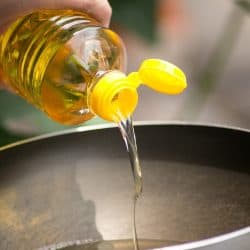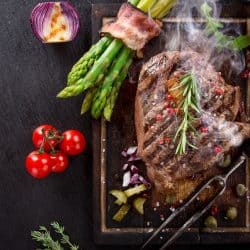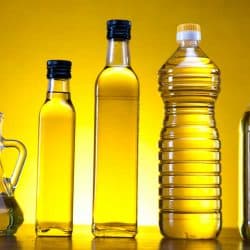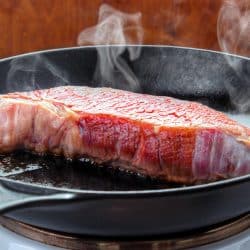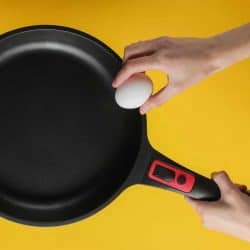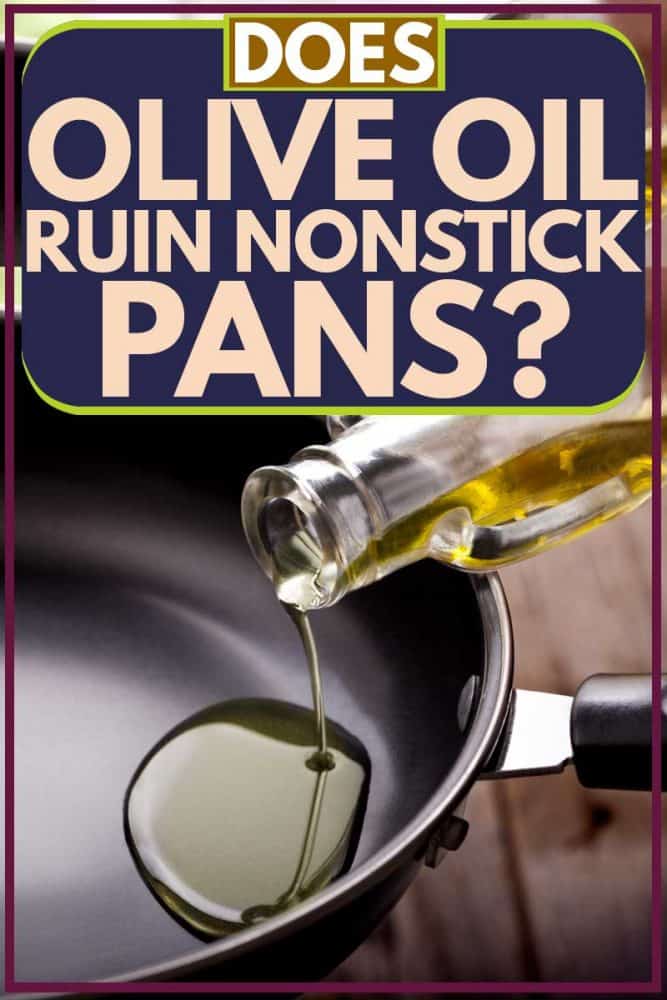 Beloved for its peppery flavor and heart-healthy compounds, olive oil remains one of the world’s most famous cooking oils. Just because TV chefs almost always use EVOO, however, doesn’t necessarily mean it’s safe to use on a hot nonstick pan. But don’t worry; we’ve thoroughly researched how to properly use olive oil so you could enjoy this product’s benefits without damaging your pans.
Beloved for its peppery flavor and heart-healthy compounds, olive oil remains one of the world’s most famous cooking oils. Just because TV chefs almost always use EVOO, however, doesn’t necessarily mean it’s safe to use on a hot nonstick pan. But don’t worry; we’ve thoroughly researched how to properly use olive oil so you could enjoy this product’s benefits without damaging your pans.
Yes, olive oil could ruin your nonstick pan if you heat the oil above its smoke point. As long as you keep your nonstick pan over low heat, however, olive oil usually doesn’t cause any significant damage.
For more detailed information on how olive oil affects nonstick pans, be sure to read the information below. In this post, we’ll go over how to properly use olive oil and a few alternative oils that might extend the longevity of your nonstick pans.
Olive Oil And Nonstick Pans: What You Need To Know
Olive oil on its own won’t harm your nonstick pans, but it could have a detrimental effect if you cook at high temps. Here are all the facts you need to know about using this popular oil on your precious pans.
How Can Olive Oil Harm Nonstick Pans?
To understand how olive oil can damage nonstick pans, we have to explain the term “smoke point.” A smoke point refers to the temperature at which a cooking fat degrades to the point of burning. As you could tell from the name, oils reach their smoke point when they start producing smoke.
After olive oil passes its smoke point, it can create a nasty, encrusted layer that clings to the pan’s surface. It’s incredibly challenging to get this byproduct off of your pan without using abrasive cleansers that could deteriorate your pan’s nonstick surface.
Other drawbacks of cooking any oil past its smoke point include an unpleasant taste and a reduced nutrient count. Some studies also suggest that burnt oils could produce potentially damaging carcinogens.
Officially, olive oil has a smoke point between 350°F and 468°F. The more refined your olive oil is, the better chance it will have a higher smoke point.
Are Olive Oil Aerosol Sprays Safer Than Traditional Oil?
No, aerosol cooking sprays are more dangerous for your pan’s surface compared with traditional oils. It doesn’t matter what cooking spray you use; they all have ridiculously low smoke points. Plus, the additional emulsifiers and propellants found in cooking sprays will create a sticky sheen that’s very tricky to get rid of.
Is Extra Virgin Olive Oil Different From Regular Olive Oil?
Extra virgin olive oil (EVOO) is the least refined version of olive oil on the market. To be labeled EVOO, manufacturers have to extract all of their oil without the use of heat. This cold-pressed oil has no additives, which translates to a more complex flavor and, of course, a higher price tag.
All other olive oils (e.g., “pure” or “light”) have some degree of refinement. While there might be some EVOO in a regular olive oil product, it’s mixed with various secondary chemicals and additives that help extend the oil’s shelf life and lower its price tag.
While you could use either of these oils for cooking, chefs tend to prefer working with regular olive oil on nonstick pans. Regular olive oil has a neutral flavor and a higher smoke point, which makes it easier to work with. Since you’re paying a premium to enjoy the taste and nutrients of EVOO, it’s best to savor your EVOO as-is on salads or in bread dips.
For quick reference, here are the critical differences between EVOO and regular olive oil:
Extra Virgin Olive Oil
- More expensive
- Darker color
- Rich nutty & peppery flavor
- Lower smoke point
- Ideal for salad dressings and bread dips
Regular Olive Oil
- More affordable
- Lighter color
- Neutral flavor
- Higher smoke point
- Ideal for cooking
By the way, if you’re looking for a high-quality extra virgin olive oil, then check out this Amazon link to the highly decorated Ellora Farms brand.
General Questions About Oils & Nonstick Pans
In this section, we’ll tackle a few general questions about using oil in a nonstick pan. People who are interested in finding an alternative to olive oil will also learn about oils with higher average smoke points.
Should You Oil Nonstick Pans?
While it’s ultimately a personal call, there are advantages to placing a little oil on a nonstick pan. For starters, the added lubrication can extend your pan’s longevity. Adding about a teaspoon of oil can also help more evenly distribute the heat on whatever you’re cooking. Plus, depending on what oil you use, oiling your pan can add a nice touch of flavor.
Of course, you don’t need to pour a large cup of oil into your nonstick pan. Usually, one or two teaspoons of oil will get the job done.
How Do You Get Oil Off A Nonstick Pan?
One easy way to get rid of any oil clinging to your nonstick pan is to fill your pan with water and add about ½ cup of white vinegar. Place your pan on a burner and bring the water to a boil. You should notice the oil rising to the surface. Now, dump the water down the drain and hand-wash your pan with a soapy sponge.
While we’re on the subject of cleaning, please resist the urge to place your pan in the dishwasher. The mixture of super hot water and strong detergent will quickly degrade your pan’s nonstick layer. The best way to clean nonstick pans is to hand-wash them with warm, soapy water.
What Types Of Oil Are Best Suited For Nonstick Pans?
Choosing your ideal oil depends on many factors, including what you’re cooking, the oil’s nutritional benefits, and the oil’s taste. For nonstick pans, however, most chefs prefer oils with high smoke points.
The oils below are usually preferred for use in nonstick pans because they have high smoke points:
- Safflower oil
- Peanut oil
- Canola oil
- Grapeseed oil
Keep It Mild When Cooking With Olive Oil
While olive oil doesn’t have the highest smoke point, it can be safely used on a nonstick pan. To be on the safe side, use a refined olive oil versus EVOO when cooking. The higher smoke point in regular olive oil will save you a lot of aggravation when it comes time to clean your nonstick pan.


